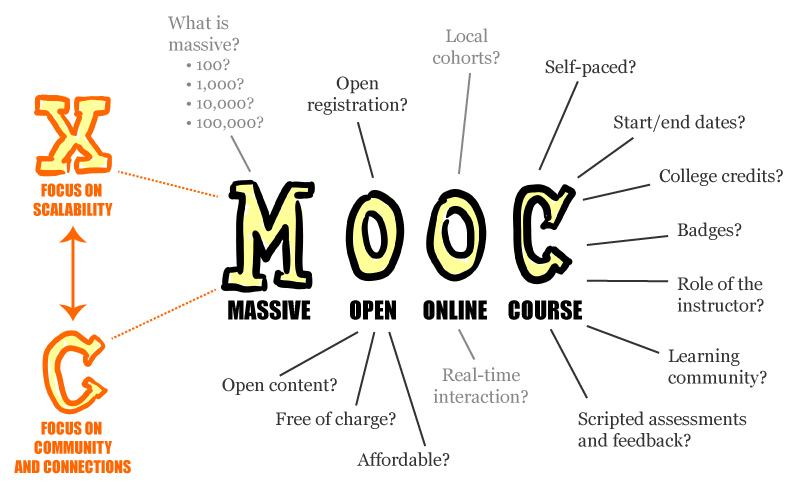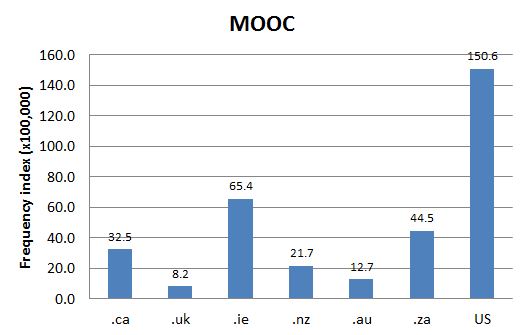DCHP-2
Massive Open Online Course MOOC DCHP-2 (July 2016)
n. — Education
an online course, often a distance course, aimed at large-scale interactive participation.
Type: 1. Origin — This term was apparently created by Canadian scholar Dave Cormier of the University of Prince Edward Island in reference to a free online course created by George Siemens and Stephen Downes at the University of Manitoba (see the 2008 quotation). There is some dispute over who coined the term or the acronym. Creed-Dikeogu & Clark (2013:10) write that "the MOOC can be traced back to a Proto-MOOC which was created at Utah State University in 2007 by David Wiley" but did not use the acronym. After the successful implementation of the first MOOC at the University of Manitoba (see the 2008 and 2012 quotations), both the concept and the term MOOC spread to Ivy League universities in the US. Notably, in 2011, two Stanford University professors "enrolled 90,000 and 160,000 students, respectively" (ibid.), and thereby popularized the idea, which gained considerable momentum from that point on. In the following year The New York Times dubbed 2012 "The Year of the MOOC" (see second New York Times reference).
The most popular five MOOC platforms are Coursera, which works with 15 top schools around the world, including Stanford and Yale; EdX, which is a partnership between the Massachusetts Institute of Technology and Harvard University; and Udacity, Erasmus and Academic Room.
In collaboration with universities, the platforms aim to extend their offerings beyond free courses for the general public by introducing degrees that could be completed through MOOCs. According to The New York Times, one of the first such degrees (master's degree in computer science) is offered by the Georgia Institute of Technology through Udacity "for a fraction of the on-campus cost" (see first New York Times reference).
In order to distinguish the original MOOC concept from newer concepts, the terms xMOOC and cMOOC are in use (see Image 1), where xMOOCs "focus on knowledge duplication" (Stevens 2013:5), such as in large first-year university courses. cMOOCs, on the other hand, focus on "knowledge creation and generation" (ibid.). Because of the MOOCs' success and popularity, the concept has spread to other countries (see the 2012 quotation). The term is now more frequent outside of Canada, particularly in the US (see Chart 1).See also: MOOC
- The term is almost exclusively used in its acronym form MOOC.
References:
- Creed-Dikeogu & Clark (2013)
- New York Times "Master’s Degree Is New Frontier of Study Online" Accessed 1 Nov. 2013
- New York Times "The Year of the MOOC" Accessed 24 Oct. 2013
- Stevens (2013) "What's with the MOOCs?" Accessed 24 Oct. 2013
Images:

Image 1: MOOC poster. Source: Wikimedia Commons. Photo: M. Plourde
Chart 1: Internet Domain Search, 18 Oct. 2013
